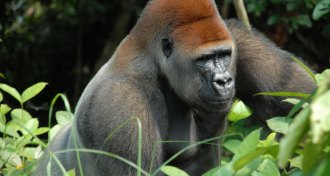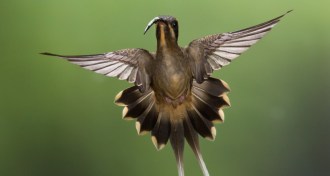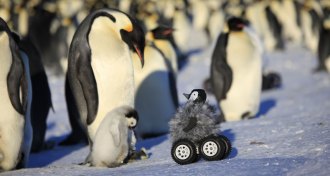All Stories
-
 Health & Medicine
Health & MedicineIncrease in Denmark’s autism diagnoses caused by reporting changes
Changes in how autism is detected and recorded explain 60 percent of the recent increase in diagnoses, a Danish study finds.
-
 Cosmology
CosmologyGamma rays offer mixed messages on identity of dark matter
Conflicting results from Fermi telescope puzzle astronomers about dark matter’s true identity.
By Andrew Grant -
 Chemistry
ChemistryAtom breaks limit of lost electrons
An iridium atom sets the record for highest oxidation state at +9.
By Beth Mole -
 Life
LifeGut microbes less diverse in humans than in apes
An analysis of gut bacteria shows that humans have evolved to possess less diversity in microbe populations.
-
 Animals
AnimalsDog disease threatens Siberian tigers
Canine distemper virus poses a particular danger to small groups of the big cats.
-
 Life
LifeHummingbirds take stab at rivals with dagger-tipped bills
Sharp points on the bills of male long-billed hermit hummingbirds may have evolved as weaponry.
By Susan Milius -
 Earth
EarthMore multi-tornado days in the forecast for U.S.
The number of days per year with tornadoes has gone down over the last few decades in the U.S., but the number of days that see 30 or more twisters is going up.
-
 Astronomy
AstronomyAmateur astronomer spots supernova in nearby galaxy
Koichi Itagaki noticed the exploding star as a brilliant point of light in the spiral galaxy M61.
-
 Psychology
PsychologyMastering the art of self-control
Walter Mischel, the psychologist behind the marshmallow test, discusses his new book on self-control and willpower.
By Bruce Bower -
 Health & Medicine
Health & MedicineMoms are more likely than dads to chat with newborns
Even when fathers are around, mothers tend to talk to their babies more and respond to infants’ vocalizations.
-
 Astronomy
AstronomyRendezvous with a comet
On November 12, Rosetta mission scientists successfully completed the first-ever attempt to put a lander on a comet. See all Science News coverage of Rosetta and Philae's voyage to comet 67P/Churyumov-Gerasimenko.
-
 Animals
AnimalsRemote-controlled rover doesn’t spook penguins
Remote-controlled rovers get close to skittish penguins without bothering them; a chick disguise wins over the wariest birds.